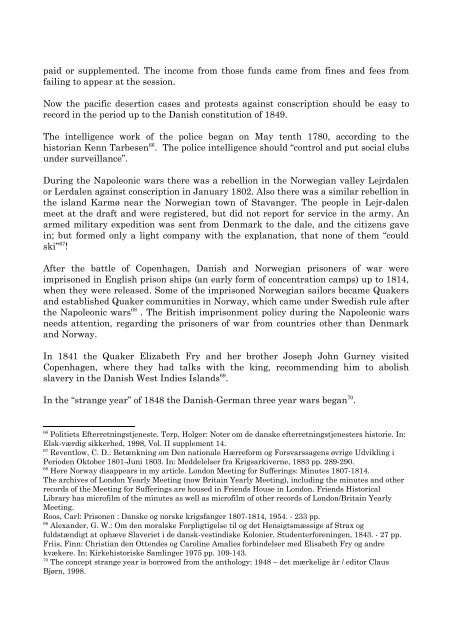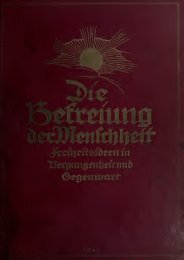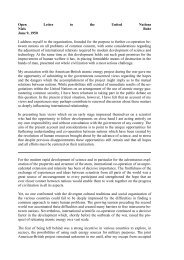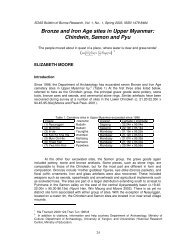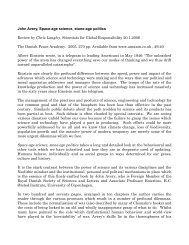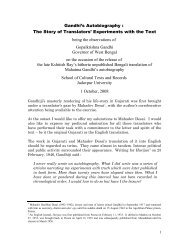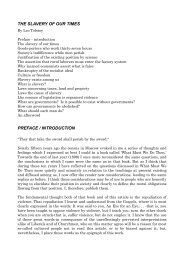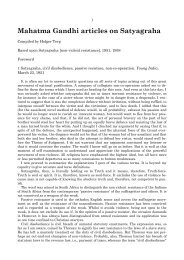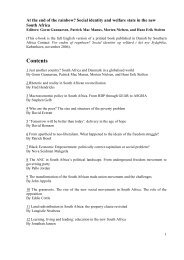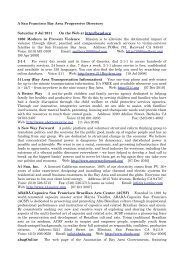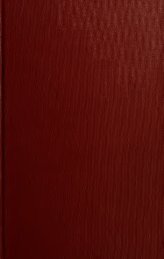Terp, Holger: Danish Peace History - Det danske Fredsakademi
Terp, Holger: Danish Peace History - Det danske Fredsakademi
Terp, Holger: Danish Peace History - Det danske Fredsakademi
You also want an ePaper? Increase the reach of your titles
YUMPU automatically turns print PDFs into web optimized ePapers that Google loves.
paid or supplemented. The income from those funds came from fines and fees from<br />
failing to appear at the session.<br />
Now the pacific desertion cases and protests against conscription should be easy to<br />
record in the period up to the <strong>Danish</strong> constitution of 1849.<br />
The intelligence work of the police began on May tenth 1780, according to the<br />
historian Kenn Tarbesen 66 . The police intelligence should “control and put social clubs<br />
under surveillance”.<br />
During the Napoleonic wars there was a rebellion in the Norwegian valley Lejrdalen<br />
or Lerdalen against conscription in January 1802. Also there was a similar rebellion in<br />
the island Karmø near the Norwegian town of Stavanger. The people in Lejr-dalen<br />
meet at the draft and were registered, but did not report for service in the army. An<br />
armed military expedition was sent from Denmark to the dale, and the citizens gave<br />
in; but formed only a light company with the explanation, that none of them “could<br />
ski” 67 !<br />
After the battle of Copenhagen, <strong>Danish</strong> and Norwegian prisoners of war were<br />
imprisoned in English prison ships (an early form of concentration camps) up to 1814,<br />
when they were released. Some of the imprisoned Norwegian sailors became Quakers<br />
and established Quaker communities in Norway, which came under Swedish rule after<br />
the Napoleonic wars 68 . The British imprisonment policy during the Napoleonic wars<br />
needs attention, regarding the prisoners of war from countries other than Denmark<br />
and Norway.<br />
In 1841 the Quaker Elizabeth Fry and her brother Joseph John Gurney visited<br />
Copenhagen, where they had talks with the king, recommending him to abolish<br />
slavery in the <strong>Danish</strong> West Indies Islands 69 .<br />
In the “strange year” of 1848 the <strong>Danish</strong>-German three year wars began 70 .<br />
66 Politiets Efterretningstjeneste. <strong>Terp</strong>, <strong>Holger</strong>: Noter om de <strong>danske</strong> efterretningstjenesters historie. In:<br />
Elsk-værdig sikkerhed, 1998, Vol. II supplement 14.<br />
67 Reventlow, C. D.: Betænkning om Den nationale Hærreform og Forsvarssagens øvrige Udvikling i<br />
Perioden Oktober 1801-Juni 1803. In: Meddelelser fra Krigsarkiverne, 1883 pp. 289-290.<br />
68 Here Norway disappears in my article. London Meeting for Sufferings: Minutes 1807-1814.<br />
The archives of London Yearly Meeting (now Britain Yearly Meeting), including the minutes and other<br />
records of the Meeting for Sufferings are housed in Friends House in London. Friends Historical<br />
Library has microfilm of the minutes as well as microfilm of other records of London/Britain Yearly<br />
Meeting.<br />
Roos, Carl: Prisonen : Danske og norske krigsfanger 1807-1814, 1954. - 233 pp.<br />
69 Alexander, G. W.: Om den moralske Forpligtigelse til og det Hensigtsmæssige af Strax og<br />
fuldstændigt at ophæve Slaveriet i de dansk-vestindiske Kolonier. Studenterforeningen, 1843. - 27 pp.<br />
Friis, Finn: Christian den Ottendes og Caroline Amalies forbindelser med Elisabeth Fry og andre<br />
kvækere. In: Kirkehistoriske Samlinger 1975 pp. 109-143.<br />
70 The concept strange year is borrowed from the anthology: 1948 – det mærkelige år / editor Claus<br />
Bjørn, 1998.


